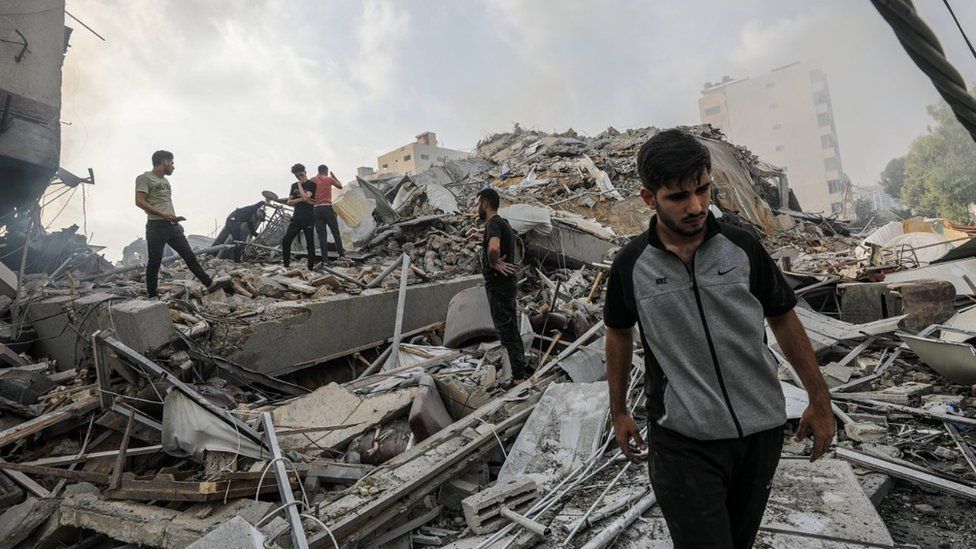Gaza hospital deluged as Israel retaliation kills and wounds hundreds
- Published

Many Gaza homes near targeted buildings have been reduced to rubble
On Saturday morning, people in Gaza celebrated after Hamas fired thousands of rockets into Israel and launched deadly cross-border attacks.
A day later, the picture was very different.
After non-stop Israeli shelling, people were staying indoors. Explosions continued throughout Sunday.
The sound was terrifying. Clouds of black smoke engulfed buildings across the Gaza Strip.
The Israeli army says it has hit more than 1,000 targets in Gaza. These include military positions, the homes of the Hamas's leaders, as well as banks run by the militant group.
One of the more significant Israeli strikes on Sunday morning targeted the Watan Tower, which serves as a hub for internet providers in Gaza.
More on Israel-Gaza attacks
Follow live: Latest updates
Analysis: Israel blindsided, says Jeremy Bowen
Palestinian health officials say more than 400 people have been killed in retaliatory Israeli air strikes on Gaza.
Most areas are without electricity as Israel has stopped supplying Gaza with power. Gaza's own supplier can only provide 20% of the electricity needed.
Food and water supplies have also been cut.
Driving through the Gaza city centre on Sunday morning, I saw rubble blocking roads. Shops were closed, except for a few bakeries where long queues had formed.
The escalation has made Gaza's dreadful humanitarian situation even worse.
Its under-equipped hospitals - which at the best of times struggle to provide healthcare to a population of more than two million people - have launched desperate appeals for blood donors.
Mahmoud Shalabi, Gaza director of the charity Medical Aid for Palestinians, described the city's main hospital as a "slaughterhouse".
Many people were lying on the ground in the emergency department, he said. "There were many dead bodies in the morgue and many medical staff were unable to cope with the huge influx of casualties they were receiving," Mr Shalabi added.
Missile strikes next to BBC Gaza rooftop base
Later on Sunday, residents in one part of Gaza City received SMS messages from the Israeli army advising them to go to shelter ahead of strikes.
More than 20,000 people made their way to United Nations sites in the area, a UN representative told the BBC.
Hamas, which has controlled Gaza for the past 17 years, knows the consequences of attacking Israel - so it must have been expecting such massive retaliatory strikes.
The Iran-backed group has made clear that it is prepared for a war with Israel. Hamas has said it has been smuggling weapons despite the Israeli-Egyptian blockade and developing its own arsenal.
The group has vowed to continue what it calls "retaliatory attacks". After a pause on Saturday night, it said it had fired 100 rockets at the southern Israeli town of Sderot.
Ordinary Gazans have expressed mixed feelings about this unprecedented conflict. Although some saw Hamas' rocket attacks as a cause for celebrations, many are worried that the violence will continue for a very long time.
Are you personally affected by the issues raised in this story? If it is safe to do so, you can get in touch by emailing haveyoursay@bbc.co.uk, external.
Please include a contact number if you are willing to speak to a BBC journalist. You can also get in touch in the following ways:
WhatsApp: +44 7756 165803
Tweet: @BBC_HaveYourSay, external
Please read our terms & conditions and privacy policy
If you are reading this page and can't see the form you will need to visit the mobile version of the BBC website to submit your question or comment or you can email us at HaveYourSay@bbc.co.uk, external. Please include your name, age and location with any submission.
Related Topics
- Published8 October 2023
- Published5 April